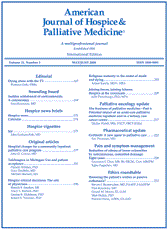Publications
American Journal of Hospice &
Palliative Medicine
Abstracts
Subscription information
Advertising information
Editorial
review board
Current table of contents
Order
reprints
Manuscript submission
American Journal of Alzheimer's Disease & Other Dementias
Activities Directors' Quarterly for Alzheimer's & Other Dementia Patients
American Journal of Recreation Therapy
American Journal of Hospice & Palliative Medicine
 |
Melatonin slows cancer but is little usedWeston, MA, July 27, 2005--Despite growing evidence that melatonin significantly improves risk, survival, and performance status in patients with advanced cancer, it continues to be overlooked as a therapeutic option because it lacks US Food and Drug Administration (FDA) approval and requires administration at times of day inconvenient to physicians. Fade Mahmoud, MD, of the University of South Dakota at Sioux Falls, and colleagues conducted a review of the literature from 1990 to 2004 to assess the benefits of melatonin, a hormone secreted by the pineal gland, as supported by clinical research. Their findings appear in the July/August 2005 issue of American Journal of Hospice & Palliative Medicine. More . . . |
Palliative oncology update. The therapeutic application of
melatonin in supportive care and palliative medicine
Fade Mahmoud, MD;
Nabeel Sarhill, MD; Miroslaw A. Mazurczak, MD
Volume 22, Number 4;
July/August 2005; pages 295-309
Abstract
Melatonin is a hormone produced mainly in the pineal gland. Plasma levels exhibit a circadian variation with the highest concentration occurring at night. The human biologic effects of melatonin depend upon the time of day it is made available. One of these effects is the setting and resetting of circadian clocks (chronobiotic effect). Additionally, it may be a potent antioxidant and immunomodulator and has been shown to have antitumor, anticytokine, anti-insomnia, and anticachexia effects. Melatonin has also been shown to improve survival and performance status in patients with advanced cancer. Objective tumor response occurs with melatonin alone or when combined with interleukin-2 (IL-2). Further, melatonin reduces radiation- and chemotherapeutic-induced toxicity. Symptomatic and circadian disruption is linked to increased cancer risk. The chronobiotic capacity of melatonin to reset circadian clocks may provide a verifiable strategy to reduce cancer risk and enhance quality of life by diminishing cancer-induced circadian disruption.
Key words: melatonin, cancer, insomnia, immunotherapy, cachexia, circadian, chronobiotic
| Subscription information | Advertising information | Editorial review board | Current table of contents | Order reprints | Manuscript submission |
| Abstracts | Cumulative indices | ||||
Copyright (c)2005 Prime National Publishing
Corp. - ALL RIGHTS RESERVED
Web author: Deborah Rines
Last update:
07/28/2005